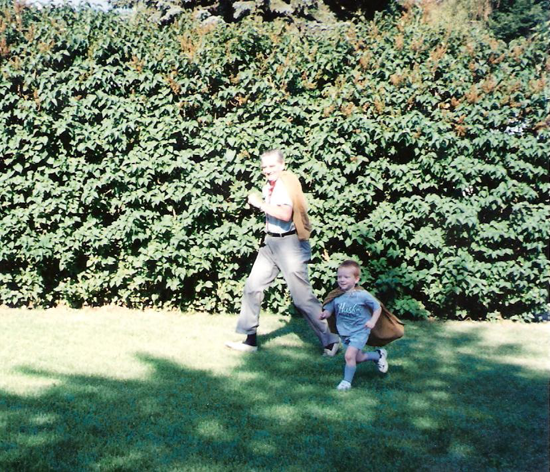“Our deepest fear is not that we are inadequate. Our deepest fear is that we are powerful beyond measure. It is our light, not our darkness that most frightens us. We ask ourselves, Who am I to be brilliant, gorgeous, talented, fabulous? Actually, who are you not to be? You are a child of God. Your playing small does not serve the world. There is nothing enlightened about shrinking so that other people won’t feel insecure around you. We are all meant to shine, as children do. We were born to make manifest the glory of God that is within us. It’s not just in some of us; it’s in everyone. And as we let our own light shine, we unconsciously give other people permission to do the same. As we are liberated from our own fear, our presence automatically liberates others.” ~ from A Return to Love, by Marianne Williamson
My friend Heather recently decided to take some risks in her life; to let herself fly into the unknown of her dreams and follow her heart. She quit her job and signed up for a dance workshop and some yoga training without any clear idea on where these paths are going to lead. As you can imagine, she feels excited about the new possibilities and adventures that await her.
Not long after making this decision, Heather visited her grandmother, Betty, and shared her plans with her. When Heather finished speaking, Betty quietly replied, “That sounds like a nice hobby, dear, but what are you going to do for work?”
Sound familiar?
The generation gap of dream fulfillment
Heather’s grandmother was coming from a good intention, of course. She was looking out for what she thought was best for her daughter. Betty comes from a different generation, one where you generally didn’t take risks like that. Sixty years ago you stayed with your job because you were lucky to have one. Gallivanting from one job to another, traveling across the earth soul searching and without a plan for the future, was for the most part unacceptable, irresponsible and unheard of (especially for woman!); and besides, by the time you were Heather’s age of 36, you should be settled with a family.
This protective practical response Heather received is not unique to her relationship with Betty. She has heard it many times before from her mother as well. The generation gap of beliefs and values between her mother and grandmother is small compared to the gap between Heather and her mother. So it’s not surprising that Heather has heard similar words of concern from her mother when sharing her out-of-the-box ideas.
Dimming your light
Heather remembers her mother and grandmother as always being decidedly clear that one must live within customary lines of behavior. As a child Heather responded to their worldview by hiding her joyous effervescence and ensuring that she did not stand out in any way. She chose to dim her inner light so that it matched the wattage of her family’s light. She continues to do this today by, using Heather’s words, deflating her dreams.
“I can literally feel myself leaking the energy of my dreams out of my body when I am with my mother or grandmother,” Heather told me. And when I asked her why she did this, she responded by saying, “Because I don’t want to threaten the sacrifices that they both made. They sacrificed their dreams so that they could cope and fit in with what was expected when they were young. So I don’t want to make them feel uncomfortable by sharing my dreams with them. They never got to live out their dreams, so I protect them by deflating my own.”
Heather went on to say that when she was young she took on the role of being a Caretaker; so protecting her family and ensuring that they do not feel uncomfortable always felt like a natural and loving choice.
Tall poppy syndrome
Deflating our dreams is not unique to Heather and her family. This impulse to deflate—to sublimate our feelings, desires and dreams—comes from a universally held belief that it is not right, and therefore not safe, to be powerful. Standing out, being too talented or wildly expressive, is for so many inappropriate or “too much”. There is even a pejorative term—tall poppy syndrome—to describe a social phenomenon of criticizing others for their talents and achievements. We knock others down because we have learned to knock ourselves down. The rejected parts of our free spirit are projected onto others and we become tall poppy choppers—we chop anyone who stands too tall. Our world is thus full of people afraid of their own brilliance; who tiptoe through life by seeking approval, laying low, fitting in and practicing fear-based humility.
Deflating clearly serves a purpose: it is an act of self-preservation, of protecting oneself from the critiques of others. The problem is that we have been doing it for so long that we have forgotten our brilliance; moreover, we unconsciously define our relationships and love from the ancient fears we hold of our power.
Love as an agreement
When individuals choose to play small with each other in a family (or any other kind of relationship system), they fulfill an unconscious agreement that goes something like this: If I play small, you get to play small. If you avoid your power, you allow me to do the same. At an early age Heather entered into an unconscious pact with her family to collude through deflation. This pact is what we call love. Love, in so many cases, is an agreement—a commitment between two or more parties to assist one another to play small and not feel uncomfortable.
We assist one another through the roles we play. Roles are simply the unique way we keep our authenticity, including our dreams and feelings, hidden safely in the shadows. They are a coping mechanism in the form of an identity that helps us deal with not being able to be who we really are, and feel what we feel. They are who we think we should be because we were never able to be who we wanted to be.
In relationships, roles unite with a common purpose of reinforcing and sustaining themselves while keeping the real vulnerable nature of the individuals tucked away. They communicate by essentially saying to each other: If you play that role, I’ll play this one. If you are the Taskmaster, I get to keep being the Avoider. If you are the Accommodator, I can keep being the Decision Maker. If you allow me to keep playing the Passive One that I have always known myself to be, you get to continue playing the Controller role that you feel safe in.
In terms of Heather and her family, their roles would say: If you play the Deflator role, I’ll play the Caretaker role and continue to deflate my dreams for you and me. If you are the Caretaker then I know you will continue to allow me to be the Deflator.
This dance of collusion is one of the oldest and most well practiced dances that we have. All of us know the steps without really understanding their impact on ourselves and our relationships.
As you can imagine, we are desperately afraid to remove our roles; we fear the vulnerability and light that shines behind them. We also don’t know who we are, or would be, without our roles; we fear the uncertainty that lies behind who we have always known ourselves to be; and we fear what might happen to ourselves, our relationships and life if we choose to be someone other than what others expect us to be; if we choose to share our heart and follow our dreams.
Heather took the risk to dance a new step by being bold and sharing her dreams with Betty. But her old shifty role of being a Caretaker got the best of her. She dimmed her 100-Watt bulb down to 50 Watts so not to overwhelm her grandmother. The agreement stayed in tact. Betty got to continue loving Heather in her dimmed state while hiding comfortably in her own. Heather got to continue playing the role of Caretaker, a role she feels comfortable playing. The Caretaker role played big so Heather and Betty could play small.
Heather was ultimately responsible for her deflation. Betty didn’t reach across and pull the plug on her dreams; Heather pulled the plug through her need to be the Caretaker. She was the true Deflator in her life, not Betty. She deflated because she equated loving her grandmother with dumbing herself down, and because on some level it made her feel safe to do so.
What’s not being said
Beneath Betty’s desire to stay true to her Deflator role lies an unspoken voice that is vulnerable and afraid. If she could speak from her heart, from the authenticity that lies beyond her role, she would say:
I don’t love you as much as I could because I have yet to love my own feelings, desires and dreams—my bright light. I have not learned to trust and follow my heart because I was taught not to at a young age. It wasn’t safe to. I did what was expected, and doing so kept me safe and out of trouble, but at a cost—the cost of my spirit, the cost of soaring brightly in the world; the cost of loving myself and others unconditionally.
It has been said countless times that we cannot love another until we love ourselves. We cannot hold space for another’s dreams until we say Yes to our own. What we fear in ourselves we will, despite our best intentions, unconsciously suppress in others.
Deflating versus withholding your dreams
Consider your current relationships with family members, significant others, friends and co-workers. Are you deflating your dreams when in their presence? And if so, why are you doing this? Is it to protect them from feeling uncomfortable? Or are you withholding your dreams as an act of dream-care and self-care?
There is a difference between deflating your dreams and withholding them. When you deflate you give your power away to others, often unconsciously; you shrink, and may even literally feel your dreams, your vitality, seeping out of you like Heather did. Withholding your dreams is different. It is a conscious choice not to share; a choice that serves your personal wellbeing and the health of your dreams.
Withholding your dreams is sometimes necessary if you know that they will not be received in a supportive way. When your dreams are new, and/or you are not used to having exciting dreams, it can feel quite vulnerable to share them with others; you don’t know how they will be received, and you may not be confident enough to withstand strong winds of resistance from others. So it may be wise to keep your dreams close to your chest. As you become more confident about your dreams and your decision to pursue them, you may find it easier to handle any doubts or criticism received from others.
Nurture your dreams
Having dreams is beautiful and natural. They call our creative spirit forth into the world with passion, purpose and wonder. Do your best to nurture and safeguard your dreams. There is no reason to rush to share them with others. Take time to anchor them in your mind and heart. Plant strong roots in your soul so that your dreams blossom fully into your life and into the lives of others.
“Dreams come true; without that possibility, nature would not incite us to have them.” ~ John Updike
* * *
Check out Vince’s book: Let the Fire Burn ~ Nurturing the Creative Spirit of Children, A Children’s Book for Adults


